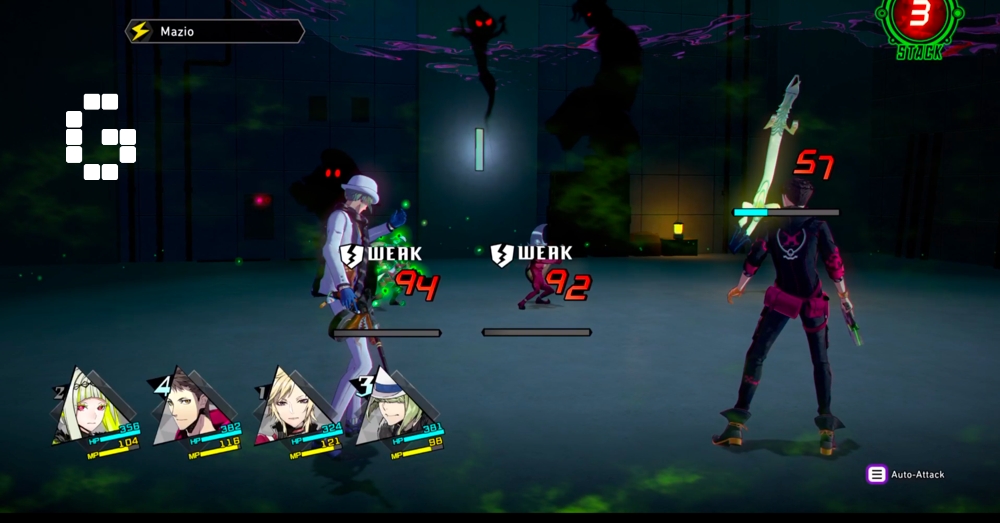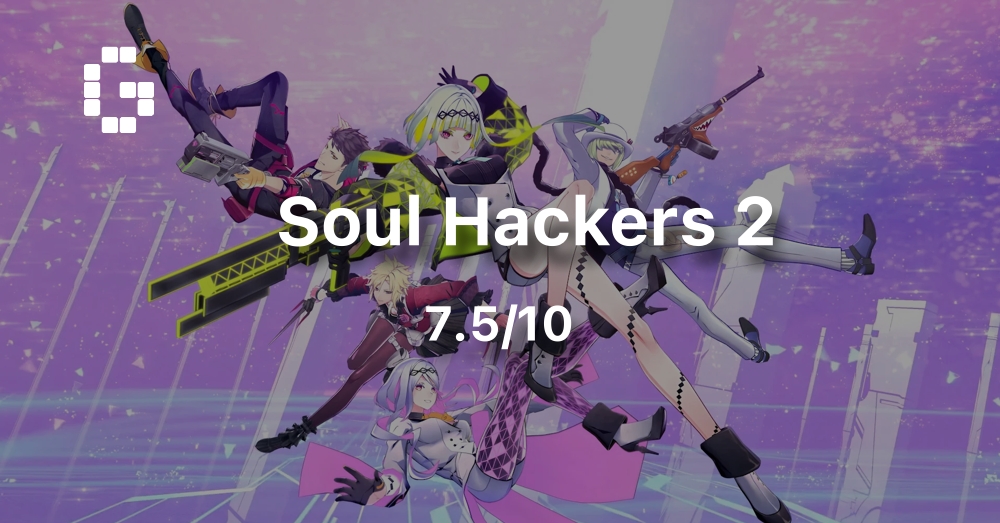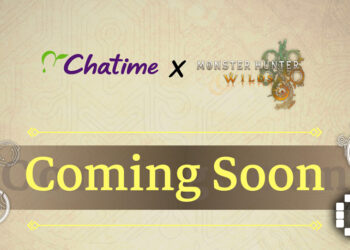Soul Hackers 2 is something of an anomaly, it’s the latest game in the Shin Megami Tensei: Devil Summoner sub-series, and specifically a sequel releasing 25 years after the original Soul Hackers. It is also the first non-Persona game to remove both the SMT and Devil Summoner branding from its title, simple being ‘Soul Hackers 2’.
It’s clear that Atlus wishes for the game to become its own IP with a very different tone, and combat style that plays around with Megaten traditional while still having plenty of callbacks for long-time fans. The game does have a couple of noticeable glitches, but for the most part, I’d say it’s successful at finding its own soul.
The Will of Aion

Soul Hackers 2 revolves around the underground conflict between two groups of devil summoners: Yatagarasu who wish to protect Japan and Phantom Society who want to resurrect an old god to recreate the world.
In order to stop the world’s destruction, an advanced AI called Aion creates physical personalities named Ringo and Figue to stop the disaster. Ringo ‘Soul Hacks’ (resurrects) and recruits three devil summoners for the mission: Arrow an agent of Yatagarasu, Milady a defector from Phantom Society, and Saizo a freelance summoner caught in the conflict.
We soon learn that the different factions are seeking the five ‘convenents’, objects of incredible power passed down through different souls. Having all five will allow a person to reshape the world. Ringo and the gang aim to uncover all five power they fall into the hands of Iron Mask, the mysterious head of Phantom Society and Milady’s former lover.
A Supernatural Sci-Fi Thriller

What set the previous Devil Summoner games apart from mainline SMT or Persona was that they were essentially supernatural mystery thrillers. We see a group of detectives or hackers uncovering the underground plots of demons and devil summoners hidden in a more urban setting.
Despite its colorful new sci-fi “anime” polish, Soul Hackers 2 very much keeps that gritty pulp spirit alive. The game hits the ground running, setting up the central plot and getting the party together within the first 2 hours, and doesn’t let up, constantly giving you more twists and reveals about the characters, various Summoner factions, and the greater mystery of the covenants. It’s a thrilling ride that kept me pushing through the dungeons to see more.
The game also features multiple callbacks to the previous Devil Summoner games. Yatagarasu and Phantom Society were organizations from the prior entries and the game even shows us more of their inner workings. Familiar faces like Victor, Madam Ginko, and a certain Katana welding family likewise make an appearance. The main story has little connection to the previous games, and you don’t need to play them to get into this game but for those that did, Atlus certainly hasn’t forgotten about you.
I did however feel the main story suffered a little as the game went on. Soul Hackers 2 is one of the shorter games in the franchise at only around 25 hours long (although it’ll be longer if you do more side content) and there are a couple of plot points later in the game that feels like they go by a little too fast. You can understand why characters act the way they do but how they reach those conclusions feels a little too sudden. Overall though, it’s a fun fast-paced plot that gives you a nice glimpse at the world of Devil Summoners.
The Characters

The characters are another highlight of the game. Ringo in particular may actually be one of my favorite Megaten protagonists, with the writers taking full advantage of the fact that she isn’t silent. She’s a joy to play as, being confident, witty, and sarcastic leading to fun dialogue between her and the rest of the cast.

She also has a solid character arc, starting the game as essentially a snarky know-it-all due to being an advanced AI. After spending time with the rest of the group, however, she learns far more about the human condition, for better or worse. The idea of AI or robots growing feelings has been done before but it’s particularly well executed here, thanks to how much Ringo stands out.
The other characters likewise are fun to be around. Arrow is a good straight man, Milady starts off hostile and overly serious but lightens overtime, and Saizo works great as the charming comic relief. The other character to highlight is Figue, the other Aion who, without saying too much, is pretty interesting.

The cast isn’t the most original but they work well together. The game actually gives you an option to bond with each of them at the bar and answer questions that bring you closer to each of them. Doing so will net you points for your Soul Level which can be used to get you more passive abilities to use in battle.
These bonding scenes are really chilled and insightful, giving you a greater idea of who these people are in their daily lives. I particularly like the fact that all the characters here are adults. They drink at the bar, talk about their relationships, and how good or bad things are going at work. It’s an area that you don’t often get in Megaten with the casts usually being of high school age. By the end of the game, you can tell how much they confide in each other and are glad to see them succeed where they can.
The Glory of The Sabbath

Soul Hackers 2 uses a turn-based combat system where you equip a demon for each of the four party members to use in battle. Outside of your standard attack, all the spells come from the demons.
The new unique mechanics of the game is the ‘Sabbath System’. When you hit an enemy with their weakness will get you a stack (signified by the shadowy silhouette of your demons looming in the background) and at the end of the turn, your demons will perform a Sabbath, a powerful attack that hits all opponents. The greater amount of stacks, the more damage it does.
The Sabbath System has a lot of promise and pulling out one of these all-out-attacks feels satisfying. As you progress, you unlock new ways to bring out even more demons from your reserve party to the Sabbath which can create more carnage. There are even moves that can heal or buff you after a sabbath making them all the more impactful and incentivizing you to build up stacks for them.
The system was pretty clearly made with newcomers in mind. It’s fairly easy to understand and doesn’t penalize the players if their attack misses or is blocked like the mainline SMT does, giving you more room to safely experiment with the system. Difficulty-wise, the game is definitely on the easier side but bosses and strong enemies can still hit hard if you’re not paying attention. Of course, if you want classic SMT levels of difficulty, cranking the game up to hard mode will certainly deliver.
That being said there’s not that much experiment with. The combat system while fun does suffer from feeling a little too simple at times. I can understand the full-on press turn system may be too brutal for a more casual-oriented title but the game limits certain mechanics that I feel would have made it more exciting. For example, there’s no Demon Negotiation in battle. You can only recruit demons that your own demons find in the dungeons. This gives you less control over what demons you can get, which in turn makes it harder to recruit them and by extension fuse and customize them.
Likewise, the game makes it difficult to swap demons into your party mid-battle. You don’t start with the ability and once you get the upgrade, you can only do it once per battle. You can get further upgrades but I don’t see why this wasn’t all included from the start. Without being able to switch out demons, you can often find yourself stuck against enemies you don’t have to right spell for, leaving you to muscle your way through the fight. It’s not hard, but it’s a little dull when you know you could easily win if you could just bring Jack Frost off the bench.
The combat isn’t bad by any means, if you enjoy other Atlus RPGs, you’ll enjoy this one and I applaud it for doing something new but it does feel a little too standard and could have used some more ambitious combat to make the sabbath truly shine.
The Dungeons Could Be Better

Unfortunately for how good the story and combat are, Soul Hackers 2 certainly puts the crawl in dungeon crawler. Aside from the final level, you’ll be trudging through dark, drab warehouses and subway tunnels with very little excitement.
It’s fine for the game to have a complex map, but these maps just weren’t interesting to explore. There are even sections of the earlier maps where the game asks you to go back and see if your demons found an item you need to progress further into the level which led to an annoying amount of backtracking that felt like pure padding.
The worst offender is probably the optional dungeon, The Soul Matrix. While it is optional, clearing the dungeon unlocks new skills for your three non-Ringo party members including new ways to add more stacks to the Sabbath as well as revealing more of each character’s backstory. This creates a great incentive to go through them but the Soul Matrix can be very bland. It has the same tile floors in a dark room and there are three separate versions for each party member.
It certainly doesn’t help that Ringo’s run cycle is a little on the slow side. The camera is also situated right behind her and zoomed closer in, making it harder to see enemies running towards you from off camera. Overall this was the weakest aspect of the game and made traversing the different areas a bit of a slog.
One nice thing though is that when you knock down a demon, they stay knocked down and disappear after a few seconds. This gives you the choice of whether or not you want to fight them or run past them, meaning that players can choose when they want to battle and skip fights if they want to focus on exploration. It’s a nice system that makes things easier for casual players while still giving series veterans their fill.
Another element I like is the ‘Demon Recon’. When you enter a dungeon, Ringo will send out your demons to scout the area. You’ll see them throughout the area and talking with them can give you new items, heal you and net you new demon recruits. While I wasn’t a fan of recruiting this way, I really liked using the demons out of battle like this. It reminded me of how the Raidou games would let you send demons out to solve puzzles and find items for you. Demons are the heart of Megaten so always cool to see you interact with them more, not to mention they’re just practical. No need to leave the dungeon and heal when Pixie’s over there and she’ll do it for you.
Upgrading Your COMP

It wouldn’t be Megami Tensei without giving numerous ways to upgrade your character. The game doesn’t have armor to equip (outside accessories) however you are able to upgrade your Comp (weapon/demon summoning program) at the Comp Smith. This gives it new passive skills which include buffing certain elemental attacks and the absolute necessity that is Conversion, which lets you swap demons in battle.

There is of course also the Goumanden, where you can fuse demons into stronger deities. Collecting demons has always been one of the more addictive elements of Megaten and this game is no different. You can spend ages just seeing what demons you can fuse and trying to sell as many expendable wares as possible to access the compendium.
Finally, there are a number of side quests that you can access from Madam Ginko. While some of these just fetch quests, others show off some good worldbuilding, telling you more about various minor characters or just giving you a better idea of the life of a devil summoner. They’re not all worth it but there are some good ones in to sign up for.
The Devilish New Look

The most divisive element of Soul Hackers has been the new aesthetic: the design has a far more flashy sci-fi influence that strays away from the cyberpunk look of the original game. I however really like the new look of the characters and setting. Their neon-lit clothing fit in well with the more high-tech aesthetic which honestly doesn’t feel that much different from the original game.
Soul Hackers 1 was a 90s look at what the future may be like in terms of tech and fashion. Soul Hackers 2 is more or less the same but for the 2020s, with a cleaner brighter type of sci-fi but one that still has that darker, grungier undertone you’d expect of Megaten. The game certainly has the right amount of gore you’d expect from a Megaten game.
The demon models in particular also look fantastic. They’re incredibly sharp and the thicker outlines give them a darker comic-book-like feel that fits the pulp tone of the story. This is also the first time we’re seeing some of these demons in 3D like Mad Gasser or Turbo Granny giving the roster a good amount of variety. It’s a shame you don’t see them during combat outside of an ominous silhouette for the Sabbath but hey, meeting them in the dungeons is always a pleasant treat.
Closing Thoughts

Soul Hackers 2 is a solid entry into the Megami Tensei series and a good game for newcomers to get into the franchise. Its greatest strength is just how digestible it is. The story is fast-paced and engaging, peeling back the mystery of the covenants is a wild ride. Its characters, especially Ringo and Figue, are likewise fun to be around, and with its’ shorter runtime it isn’t too bogged down in the overly long introductions or heavy plot points.
The game also pays plenty of homage to the original Devil Summoners games, with cameos, callbacks, and the overall tone, which despite the neon glow still feels reminiscent of the previous games.
This casual digestibility however can also be a weakness. The game just feels a little too safe compared to how ambitious previous Atlus RPGs have been. The dungeons are a little too plain, and I couldn’t help but feel if the battle system and demon recruitment incorporated a little more from the mainline SMT games, it would’ve really spiced up the combat more. As it is now, it’s fun and flashy but a little on the bare side.
For all its faults though, Soul Hackers 2 is worth a playthrough. It succeeds in successfully soft-rebooting the Devil Summoner series and giving the IP more identity beyond its Megaten heritage. I’m excited to see where Atlus takes the series in the future, if they can work out a couple of kinks, I can see the soul of a beautiful new revival series shining through.
| Pros | Cons |
| The plot overall is a great supernatural thriller | Certain plot points can feel rushed |
| The Characters are fun and work well off each other, especially Ringo | Dungeons are drab and can be a little boring to push through |
| The Sabbath is a cool mechanic and combat assessable to newcomers | Combat can feel too limited at times |













![[SEA Exclusive] From Shadows to Shipwrecks – Jennifer English Talks About Bringing Emotional Depth to Clair Obscur: Expedition 33](https://cdn.gamerbraves.com/2025/04/Clair-Obscur-Jennifer-English_Interview_FI-360x180.jpg)

![[EXCLUSIVE] Do the Game Interview – An Intimate Look at the Challenges of Game Development](https://cdn.gamerbraves.com/2025/04/Do-the-Game_Interview_FI-1-360x180.jpg)
![[EXCLUSIVE] Interview with the Minds Behind of Den of Wolves – 10 Chambers’ New Sci-Fi Heist FPS](https://cdn.gamerbraves.com/2025/04/Den-of-Wolves_Interview_FI-360x180.jpg)









![[GUIDE] Finding Alma’s Lost Glasses in The Apple of Her Eye Side Quest](https://cdn.gamerbraves.com/2025/04/Alma-Glasses-Quest_Gudie_FI-360x180.jpg)



![[GUIDE] Farming Nightflower Pollen in Monster Hunter Wilds](https://cdn.gamerbraves.com/2025/03/MHWilds-Pollen_Guide_FI-360x180.jpg)